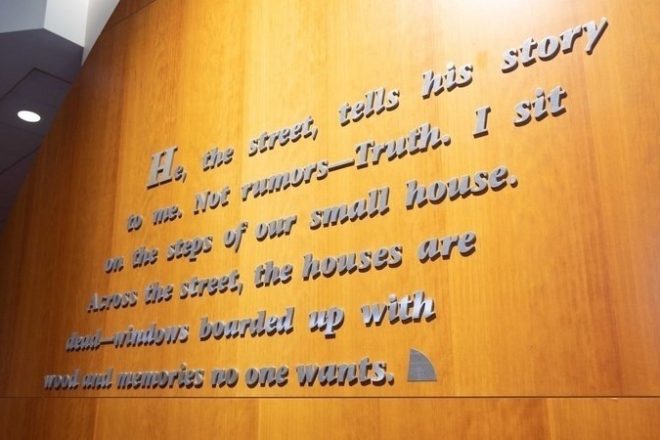The Politics of Literary Art
- Share
- Tweet
- Pin
- Share

Wisconsin Center District CEO and president Marty Brooks paused the removal last month of a literary-art installation after facing criticism from board members and others.
One of those who led the movement to halt the decommissioning of the exhibit was Kimberly Blaeser – a writer, photographer, scholar, past Wisconsin poet laureate, author of five poetry collections, University of Wisconsin-Milwaukee professor emerita and the founder of Indigenous Nations Poets (In-Na-Po).
The exhibit, called Portals and Writings Celebrating Wisconsin Authors, showcases the works of 48 writers. Short passages and poems are displayed on the center’s walls using raised or impressed lettering.
Brooks planned the decommissioning of the art as part of the Wisconsin Center District’s $456 million expansion, which is slated to open in May 2024.
During the 1990s, Blaeser was one member of a team who worked long and carefully to curate the installation that contains the works of famous Wisconsin poets.
“We wanted it to be representative of historic Milwaukee writers, a diverse selection of voices and also stars of literature,” she said. “So it’s not just about ethnicity and race – it’s about writing.”
The Wisconsin Center District is a public entity, funded with more than $40 million in tax money. The argument made by Blaeser and others was that the decommissioning was not a decision that could be made unilaterally by one person for a public space. To do so was to elide due process, breach the public trust and ultimately disrespect the uniqueness of the literary installation, Blaeser said.
“This is not a Wisconsin thing; this is not a small Milwaukee exhibit,” she said. “This is the largest art installation of its kind in the country.”
Though the exhibit’s removal and destruction are no longer a foregone conclusion, preservation is not yet assured either. When asked whether she’s confident the pause will turn into a reversal of the decision to decommission the exhibit, Blaeser said she feels hopeful, and certainly “confident that he’s [Brooks] being held accountable to some other opinions.
“I feel like people who sit on the board have heard from a significant group of people across areas of the population throughout the U.S. who have expressed their dissatisfaction,” she said. “So I think they are convinced this is not a solid move for Wisconsin, for Milwaukee. Plus, why would we do that?”
Those interested in helping to save the exhibit can sign the Change.org petition (at change.org/p/save-the-wisconsin-center-literary-displays), which had 1,208 signatures as of last week, or write to Wisconsin Center District board members (wcd.org/meet-our-board-staff-vendors), who are publicly appointed.



